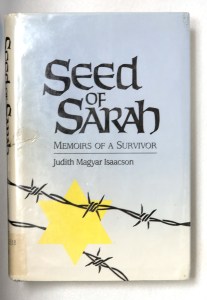AUBURN — Holocaust survivor Judith Magyar Isaacson, 90, of Auburn was remembered Wednesday as a person of great joy.
She died Tuesday at Schooner Estates in Auburn, her husband at her side.
At age 19, she was sent to the Auschwitz concentration camp by the Nazis. She survived two years at Auschwitz and married United States intelligence officer Irving Isaacson.
They raised three children in Auburn. She became a distinguished Bates College dean and wrote a book about the Holocaust, “Seed of Sarah.”
Her daughter, Ilona Bell, said Wednesday that her mother had been in failing health and had a sudden decline.
Bell said she’ll remember her mother for her courage, generosity and humanity. Despite facing evil and horrific experiences, “she always saw the best in people,” Bell said.
Her mother had a “determination to preserve her own idealistic sense of what was right.”
Isaacson also had a compelling need to tell what happened at Auschwitz “in the hope that if we remember it, it wouldn’t be repeated,” Bell said. Her message wasn’t “how horrible these people were; it was how you could overcome suffering and still preserve your sense of joy in life,” Bell said.
Isaacson was born in Hungary in 1925. An eager student and valedictorian of her high school class, she had planned to write poetry.
But in 1944 she was deported on a train to Auschwitz with her mother and aunt. At the camp, women were ordered to take off their clothes for a “medical exam.”
In her book, Isaacson wrote about a brush with the infamous Dr. Josef Mengele, who tortured and murdered Jews. Mengele watched and parted rows of nude women into three herds: one for mass rape at the Russian front and one for the work camp. A third line of the weak and sick wobbled toward a truck.
Isaacson’s mother lied about her age and stayed in the middle line, avoiding death. Isaacson and her young aunt defied Mengele, who whisked his cane at Isaacson and barked “Rechts!” for her to go right (rape line). Ignoring his command, she and her aunt rushed toward her mother, “even though they were shooting people who disobeyed,” Bell said. German soldiers let them stay together. “That’s how they survived.”
They were forced to do slave labor, filling grenades in a munitions factory.
After being liberated by American troops in 1945, Judith met Irving Isaacson, an intelligence officer with the World War II-era predecessor to the CIA. They married that year. He brought her, her mother and her aunt to America.
She and Isaacson lived in Auburn for 70 years. They had three children, a daughter and two sons, John and Mark.
When their third child was in kindergarten, Isaacson attended Bates College in Lewiston. She received a Bachelor of Arts degree in math in 1965, the same year her daughter graduated from high school.
She taught math at Lewiston High School and became the first computer science teacher at Bates College. In 1975, she became Bates’ Dean of Women Students, then Dean of Students and fought for women’s education.
Those who knew her said she was warm and positive.
Bonnie Shulman, a Bates professor who met Isaacson at a book-signing, said Isaacson was her mentor. “She was always encouraging of my career, my writing, always interested in what was going on. She was funny.”
While many Holocaust survivors didn’t talk about the death camps, Isaacson shared her experience with many classrooms of elementary, high school and college students. After a talk at Bowdoin College in Brunswick in 1976, she decided to write her book.
Bell said her parents enjoyed a long and happy marriage.
“He just adored her,” Bell said.
When asked how long they had been married, her father frequently said: “’Not long enough.'”
This past summer, he turned 100; she turned 90. They were introduced to their first great-grandchild. At Schooner Estates, they sat together for hours “absolutely devoted to each other,” Bell said.
In her final hours, her husband was at her side stroking her hand.
As she died, her husband said: “’She’s smiling,'” Bell said. “Sure enough, a smile formed on her face.”
The family is asking that instead of flowers, friends donate to The Holocaust Human Rights Center of Maine in Augusta. She gave all proceeds from her book to them, Bell said.
Services will be held at 11 a.m. Friday at Temple Shalom in Auburn.
Judith Isaacson’s memoir, “Seed of Sarah,” has become a classic about the Holocaust and is widely used in schools and colleges across the country.
Former Bates College history professor Steve Hochstadt said her book changed the narrative of the Holocaust to include women, to allow readers all over the world to understand women had a different experience from men.
“And she was willing to talk about it,” Hochstadt said.
When he taught about the Holocaust at Bates, “Seed of Sarah” was assigned reading. Isaacson often came to his class and talked to students about the Holocaust.
Speaking to 125 in a Bates auditorium, “she was so relaxed, so happy to be there, so confident.” It was a wonderful experience for students, Hochstadt said. “They were incredibly impressed with her.”
Today, he teaches at Illinois College in Jacksonville. When his students study the Holocaust, Isaacson isn’t there. “It makes a difference. It’s a loss for me.”
Isaacson’s friend and retired educator Joan Macri said as a Lewiston High School history teacher, she had read lots of books about the Holocaust. Isaacson’s book stood out.
“It was filled with hope and optimism, the opposite of most books about the Holocaust,” Macri said. That is who Isaacson was, Macri said.
“She was a person of great joy. Someone who wakes up every day and sees what’s right with the world,” she said.


Comments are no longer available on this story